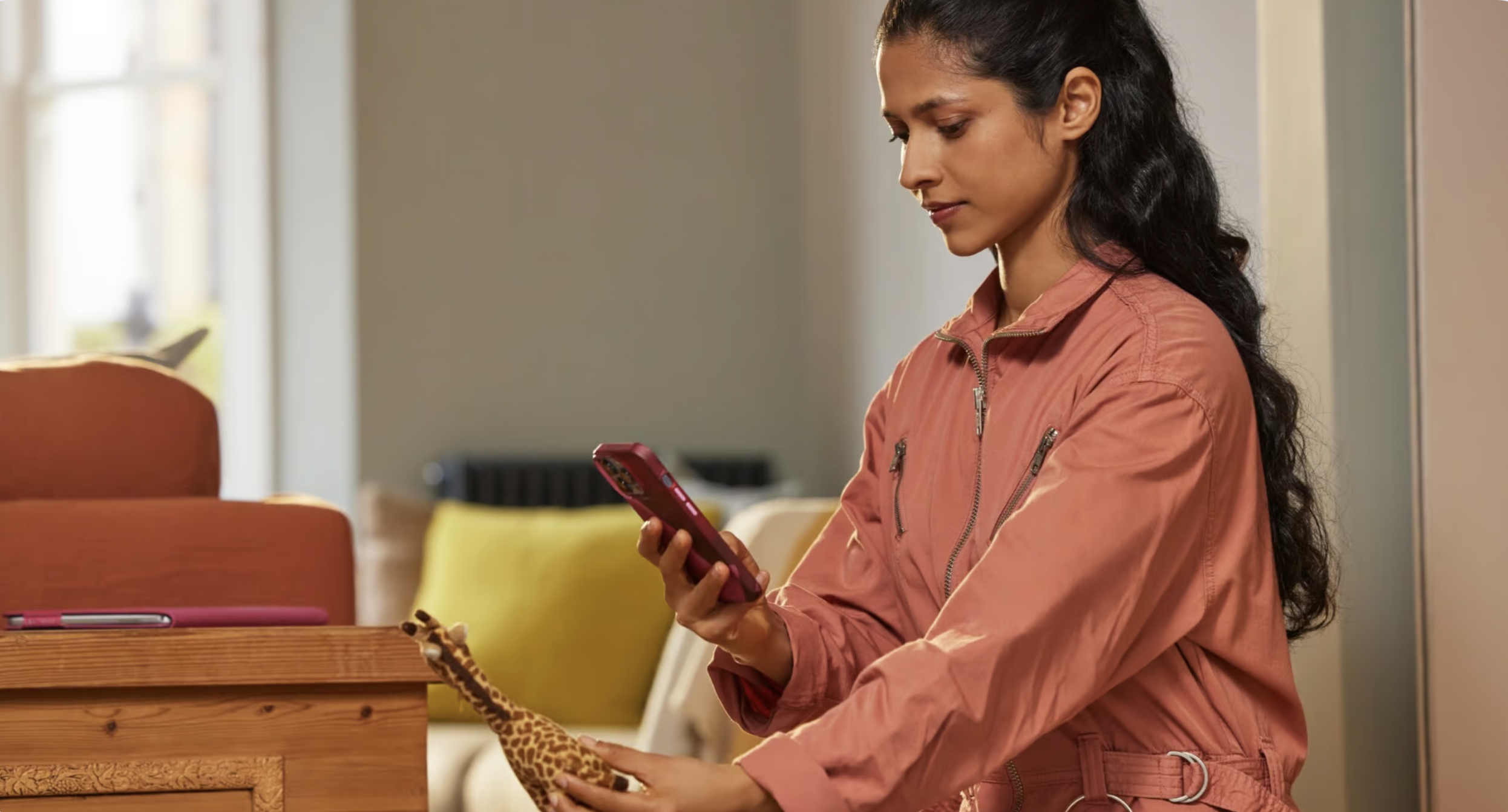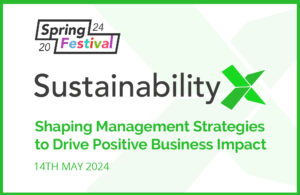A special panel at SustainabilityX, held 14 May 2024, will look at the business case for eco-friendly products and ethical practices. Ahead of the event, Katie Searles sat down with Saasha Celestial-One, co-founder of sharing app Olio, to discuss why partnerships and a far-reaching community are key to limiting waste.

Q: Firstly, tell us a little bit about yourself and Olio?
I’m co-founder and COO of Olio. My best friend Tessa and I started Olio in 2015 after meeting at business school 20 years prior. We became really good friends in a social sense, but we were also the eco warriors in our group.
When we were both on maternity leave, we had the idea to start our business together. We decided to look for an environmental challenge that we could tackle at scale, leveraging our 30 years of combined experience in the corporate world.
Tessa found herself on moving day, from Switzerland back to the UK, and she had non-perishable food she thought she’d be able to pack. The removal people said she couldn’t. So she went out in the middle of winter with two small children trying to give the food away – it didn’t work, it was very embarrassing. But it was the light bulb moment for Olio.
Neither of us would dream of wasting food, but we realised with a quick Google search that food waste was a really, really big problem. Project Drawdown – a collaboration of 160 climate scientists who study the root causes and potential solutions to the climate crisis – has repeatedly stressed that tackling food waste is the number one thing we can collectively do.
The food supply chain is just such a huge contributor to overall greenhouse gas emissions, especially when 40% of food that’s produced is never eaten. Food waste alone accounts for 10% of greenhouse gas emissions. And it’s such a senseless problem, because the vast majority of that food loss could be fed to humans.
Meanwhile, we have 800 million people going to bed hungry – in the UK it’s 13.7 million. Since we launched Olio in 2015, that figure has almost doubled. Food insecurity, food loss, food waste have all grown. And meanwhile, we have modern technology and the logistic capabilities, but the system hasn’t caught up.
Olio exists to solve that by connecting people or businesses with surplus food with those nearby who need or want it. Last year alone, we rescued and redistributed 28 million meals.
Q: What are the barriers then to tackling food waste? Is it consumers just not knowing about this problem? Or is it more a regulation point of view because it’s food? Why is food waste still such a problem in this day and age?
That’s a wonderful question, I wish I knew the real answer to that. It is obviously a nuanced and complicated situation. If you look along the supply chain, the reasons vary depending on what stage. About 20% of food loss takes place at the farm level. This is food that’s never harvested, because the price of food is so low and then there is demand for food that meets strict cosmetic requirements – shape and size etc.
There’s not as much as you might think that’s lost in manufacturing and hospitality or retail. So, excluding the farm, 71% of food waste takes place in our homes and 3/4s of that is edible. That’s not including things that are in your recycling bin, like banana peels and eggshells. It’s perfectly good food that’s perfectly edible.
Date labelling is responsible for 10 to 15% of people just looking at dates or confusion over best before and used.
There’s also a real problem between what you intend to eat and what you actually eat. We all have been there on a Sunday meal planning for the week and we’ve got really good intentions, but come Thursday all we really want is a takeaway. There is an ability to recognise and have an honest conversation about what one is or isn’t going to eat whilst that food is still edible – it is a skill.
For Food businesses, the UK is missing most of the best practice regulatory interventions that you see in the US or Europe, such as tax write offs for food that’s donated; good Samaritan laws to absolve businesses of liability for donating food; mandatory food waste reporting – we don’t have that here. As a result, we see businesses wasting 24 billion meals every year.
Q: The Olio app has grown to tackle a range of products, not just food. Was that a natural evolution? Was that something that came from your customers or was it something that was always planned from day one?
It wasn’t part of the original plan, although it did cross our mind, but we really wanted to stay focused on food. We felt there were lots of places you could interact in the peer-to-peer economy for other household items.
But we realised we were doing our users a disservice. They’d met reliable and friendly neighbours who cared about the environment and the community. So why couldn’t they share cleaning products and toiletries, coat hangers and books and toys and clothes and anything else.
People don’t have food to give away every day, so we were basically limiting the usefulness of the app – and if you’re not useful, then you get forgotten. That’s actually at the heart of our strategy to get more people to use Olio more often by continuing to layer value in terms of use cases for the end-user, whether that’s lending and borrowing sort of bigger ticket infrequent household items.
Very soon we are launching an event section for hyperlocal sustainable events, whether it’s litter picking, clothes swap, repairs, or a get together to learn how to make kombucha. There’s all kinds of things that fit within the behaviours we’re trying to cultivate in our communities.
Q: You have done great things to build a community, a neighbourhood environment. But how important is the retailer partnerships and getting big players like Tesco’s involved?
It’s been absolutely essential. That wasn’t really part of our original plan either. But our community feels quite passionately about food waste and really don’t like to see good food going to waste. Our community was out there trying to get their neighbours signed up and also speaking to local businesses and encouraging them to give away food on the app themselves.
A lot of businesses said “I don’t have time to do this, but if you want to take the food, go ahead”. That was the genesis of the Food Waste Heroes programme.
Businesses, especially the likes of Tesco, are really ambitious, have set public goals to have zero edible store waste, no good food going to landfill. They’ve spent a lot of time and energy trying to figure out how to discount products, donate them to charity, wherever they could. And at the end of that they found that they’ve got millions of meals going to waste.
Now our programme recruits volunteers from our community. We have 120,000 food waste heroes and they go through an online training and then they can claim a collection opportunity. They arrive at the store and they take the food that would have been thrown away that’s still edible and then they add it to the app and they give it away to their neighbours safely.
It’s a lot of food benefiting hundreds of thousands of people every month that’s donated from the businesses. In return the business meets their sustainability objectives, and are not asking their store staff to do the task. They also get to shout about their impact to their customers, in-store and online.
Q: You’ve recently launched Smart Living, can you tell us about how you work with like minded brands to diversify what you’re doing?
We’ve got 4 million app users in the UK alone and have this massive reach into a group of conscious consumers who are looking for brands, products and services that fit with their needs, and personal values. We recognize this is an asset and our goal is to solve the climate crisis by ending waste one share at a time.
In order to do that, we need not hundreds of thousands or millions. We need hundreds of millions of people to use Olio. We’re now at a scale whereby we’ve got something that we can sell to brands, products, and services providers that want to reach our audience, in a way that’s aligned with our mission and our values.
We can then take the proceeds of any type of campaign and then we can reinvest that, with those proceeds bringing new people into our ecosystem.
Brand partnerships are a huge part of our strategy going forward. The Smart Living, with Smart GB, included blog posts, emails and in-app in a multi channel one month campaign.
It was actually our first month-long brand partner and we’re actively looking for additional partners who want to reach our users, so that we can bring value to our users and to the brands that work with us. Importantly for us, use that sponsored content revenue to grow our network.
Registration for Celestial-One’s panel, Embrace Sustainability. Empower Retail: Understanding the business case for sustainability, is open now. For more information about SustainabilityX, held on 14 May 2024 at 133 Houndsditch, click here.
SustainabilityX is part of RetailX Event’s Spring Festival, the full agenda will be released in the coming weeks.
Stay informed
Our editor carefully curates two newsletters a week filled with up-to-date news, analysis and research, click here to subscribe to the FREE newsletter sent straight to your inbox and why not follow us on LinkedIn to receive the latest updates on our research and analysis.










